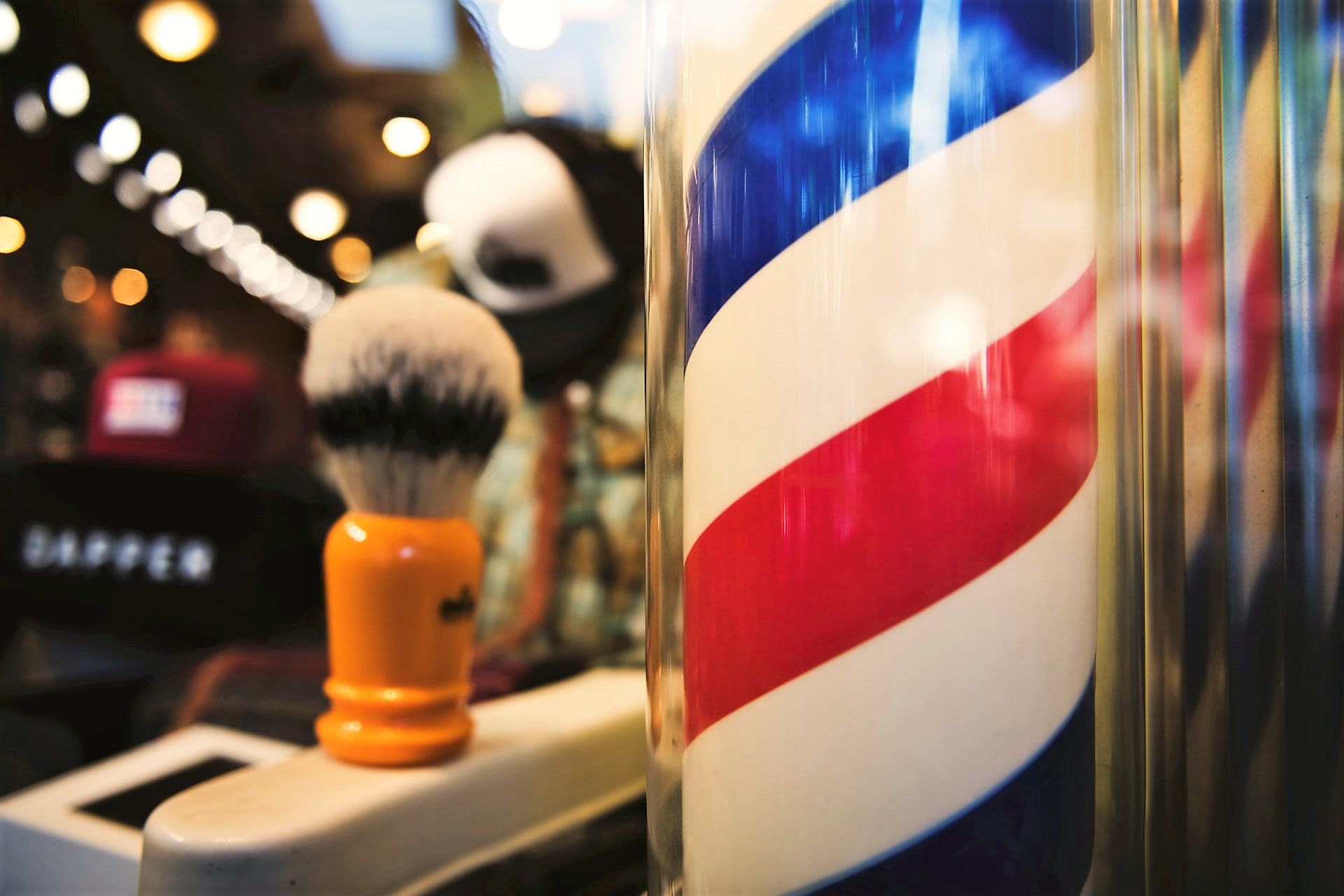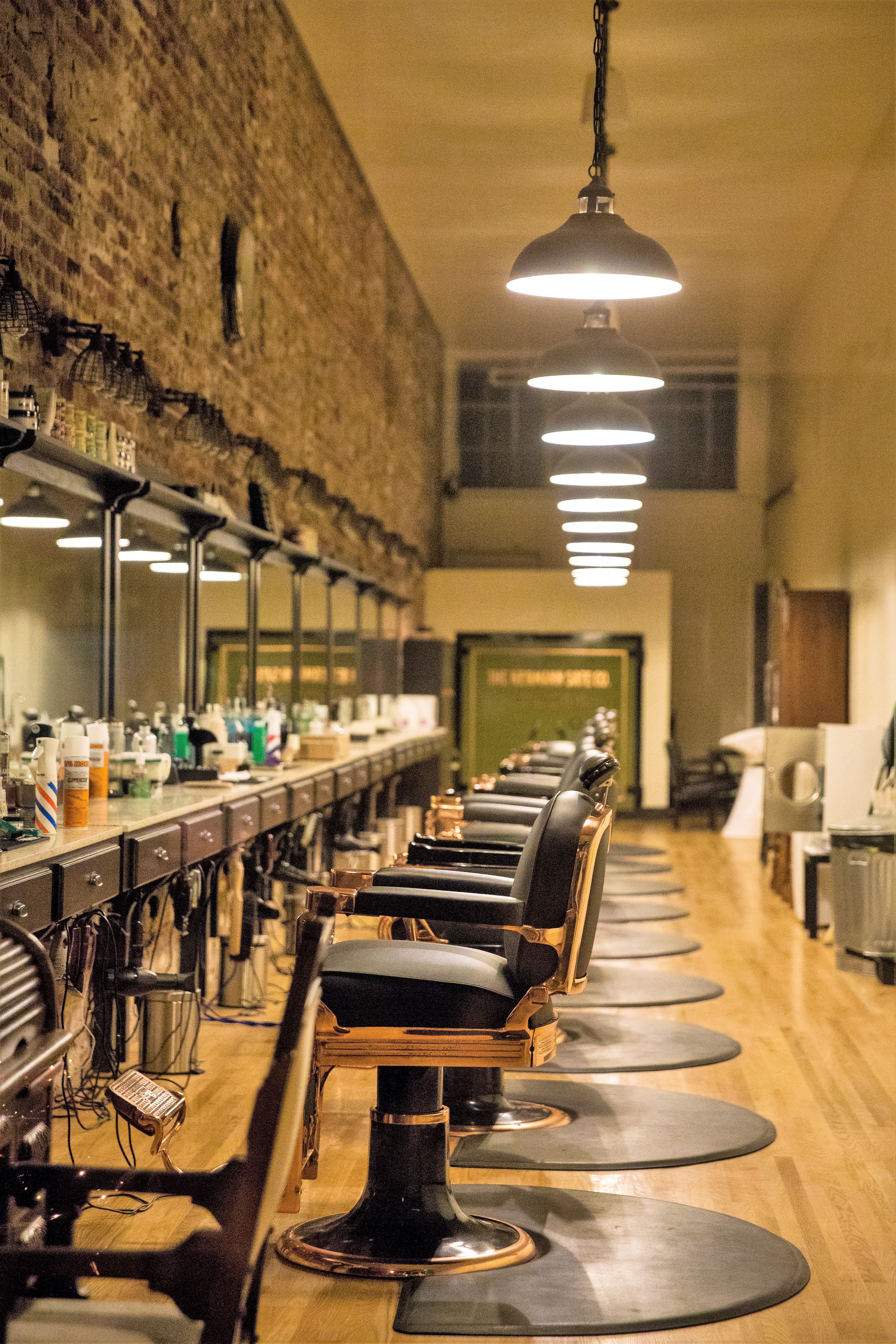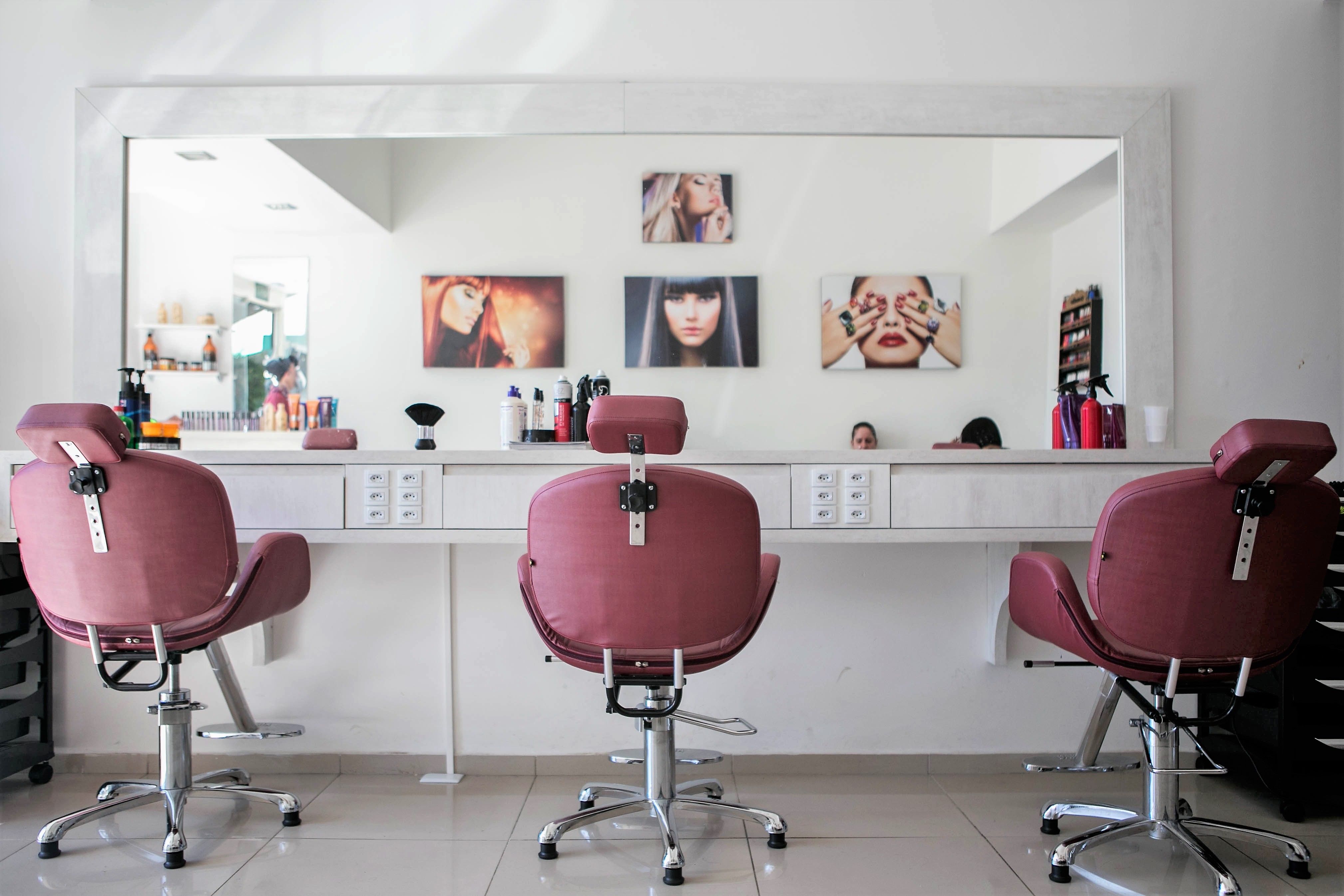Difficult as it may be to believe, we're coming up on three
months since the quarantine began and four weeks since New Orleans began "Phase
One" of reopening on May 16. During the latter time, a laundry list of
businesses have opened their doors a sliver. Phase One opened the floodgates
for a measured wave of economic activity, from retail stores to restaurants,
movie theaters, and barbershops.
Amid the technical to-do surrounding the logistics of the
resumption and understandable relief that workers feel about having an income
again, some people believe that health concerns have fallen unduly by the
wayside. Representing this category, Where
Y'at interviewed Jason Jones, ownerof
Factotum Barber + Supply.
Factotum, located in the Bywater, is a man's man type of boutique
haircut place. Copies of Playboy sit
neatly on the waiting area coffee table. Clients wear pinstriped smocks and
drink liquor out of a glass. When it comes time to shave, the barber wields a
straight razor.
Jones kept Factotum closed, even as other shops in the city reopened with Phase One. Factotum has yet to reopen today, pending what the shop's owner might call safer workplace conditions.

Why would a shop
willingly remain shut down?
Jones put it this way: "The decision came when it came time
to gather supplies and PPE." He realized that there was no agreed-on,
industry-wide standard for sanitation equipment or safety apparel. A lot of the
circumstances surrounding Phase One appeared to be sort of fly-by-night and
hasty. Government officials were clearly set on getting the economy up and
running again, but it was less apparent that they were following the science or
particularly giving enough thought to the well-being of frontline workers.
"When I started to read about the stuff, I realized there
was so much information out there," Jones said. "It was hard to know." Jones
said he feels special concern for himself, his employees, and the public at
large because barbers practice the sole trade included under the Phase One
umbrella that actually involves physically touching people. (Phase Two covers
the other ones: for instance, tattoo parlors). This complication alone raises
questions, which Jones felt underprepared to answer.
What kind of gloves should barbers wear, or should they even
wear gloves? Which type of mask offers the best protection? Maybe most
glaringly of all, how on earth can two people be socially distant when one
person is touching the other's hair? These questions are the tip of the iceberg
in terms of the considerations the global pandemic is forcing everyone who
operates a public space to account for in their respective operations.
Obviously, small business owners like Jones lack the time,
resources, and training necessary to make decisions of this magnitude on their
own. Yet, for the past several weeks in New Orleans, that's exactly what City
Hall has been asking them to do. "The state has no plan in place," Jones said.
The one group that might feasibly have the acumen and infrastructure necessary
for coming up with precise guidelines and stipulations has been virtually
asleep at the wheel.
Specifically, when it comes to the barber trade, "That is the function of the State Board of Cosmetology," Jones said. "They're concerned about the safety of the public and the safety of workers."

Thus, the Factotum Barber owner came to the decision he's
called the most difficult choice he's ever had to make during his career in
business: to take the path of greater resistance and to remain as is when seemingly
everyone else was reopening. On May 18, Jones wrote on the company's Facebook page,
"After many sleepless nights wrestling with doing the right thing, I have
decided to keep the shop closed." And, since then, he's stuck to his guns.
Do other people in
the industry feel the same way?
Comments on the post reveal a touching outpouring of support
from people sympathetic to the decision. Jones said that other barbershop
owners and industry types direct-messaged him as well, expressing their private
agreement.
In an effort to understand how other barbershops have been
faring, Where Y'at reached out to a
shop that's been operating since Phase One's initiation. A manager of an Uptown
shop said she could only talk off-the-record for personal reasons. The shop in
question, a sleek couple rooms occupying a rental studio space, seemed to be
adjusting to the new way of doing things, but not without difficulty.
The manager said she'd gotten the hang of a newly rigorous
cleaning and safety regimen. Lysol and barbicide, the industry's standard disinfectant,
out the wazoo. Customers required to wear masks and 15 minutes between each
haircut, to allow enough time for sterilization of furniture and equipment.
According to the fire marshal, the rule-of-thumb ratio is one customer per
barber.
While this shop has been getting by on something more
substantial than a wing and a prayer, it hasn't been easy. When it came time to
reopen, not one barber returned to work, except for this manager. She said one
of her employees sustained an injury riding a bike. Rotten luck. Another one
preferred unemployment benefits to work and the looming specter of the
coronavirus. A sign of the times.
When asked for her opinion on the government's handling of
things, the manager said she was happy to return to work. She loves talking to
her clients, whether trying to get a read on walk-ins or keeping up her
familiar rapport with regulars. She called it her "therapy." At the same time,
she said that the economic reopening looked like a rush job.
Take that aforementioned fire marshal's order. She said that
the only reason she was even aware of the proper social distance ratio is
because she called the fire marshal's office by virtue of her own initiative.
And the only reason she knew to do that came from her membership in a private
Facebook group belonging to New Orleans small businesspeople; the Louisiana
Board of Cosmetology was M.I.A.
Same story, different set of lips. An inaccessible city government used to a certain, top-down way of doing things issues its edicts. From the vantage point of the people on the ground, the rules take on the incorrigible momentum of the fait accompli. They were not consulted but told and, in some cases, not even that.

What's to be done?
A pandemic is a double-edged threat in that it not only
disproportionately effects the most vulnerable people in a given society, but
it also precludes those peoples' ability to organize together to come up with a
plan of action. For that reason, Jones and his compatriots haven't taken any
steps yet to redress their grievances. But there is a petition in the works
that they plan on presenting to public officials. The broad strokes of the
complaint will be as follows:
First and foremost, there needs to be better education in general.
The Louisiana Board of Cosmetology should be teaching people in the industry
about the risks they're taking just by showing up for work every day. Workers
should have access to useful information about PPE, along with everything else
that goes along with cutting hair in the midst of a public health crisis. Jones
emphasized standards. It shouldn't be left to the individual shops, owners, and
employees to figure these things out, given their relatively humble devices.
Right now, Jones said we're seeing a convoluted industry
approach to coping with the new challenges. "I'm hearing from a lot of workers
about how supplies are running out—how they're not feeling very safe in their
environment." While he stressed that he doesn't wish to speak ill of anyone in
the business, Jones said that what safety precautions people have been taking
seem insufficient.
With the government providing little input, it's difficult
to imagine how they could be doing otherwise. Even if people had a plan in
place, with the pandemic on, cleaning supplies and PPE are scarce right now.
Jones said that when he ordered his equipment, it arrived over a month late,
and even then, the distributor was only able to fill about 10 percent of his
order. Meanwhile, the company that makes barbicide said it can't keep pace with
demand.
The other leg of the hypothetical petition has to do with
testing. A case-in-point of the disjointed efforts of Phase One is the usage of
thermometers to take customers' temperatures. In some places, someone will take
your temperature right when you walk in and turn you away if it shows a fever.
Other places aren't even doing that. Even if they were, there's no evidence
that fever is a universal symptom of the coronavirus; some people appear to be
asymptomatic altogether.
Jones emphasized that "not only should testing be mandatory, but it should also be free and easily accessible to everyone in our industry." Workers shouldn't have to choose between the lesser of two evils: being out of a job or working under dangerous conditions. Testing and education should both be considered prerequisites before regular commerce gets underway again. "It's not always about making money," Jones said.
Where does Factotum
go from here?
In order to see where all of this is headed, it's important
to first understand where we've been.
At a certain point during the interview, it became clear
that Jones was speaking from a place of deep conviction. When asked if he has a
history in labor organization or activism, he said that growing up, members of
his family were union members. A little over a decade ago, Jones himself
belonged to a union as an electrician—a hazardous job, which, as such, has
strident safety standards in place. In the electrician profession, trade
organizations require that workers be educated before attempting certain
perilous tasks.
The way he sees it, that background prepared him for this
moment. Pandemic conditions have broadsided a vocation unused to having to
perform the kind of sober balancing act necessary to compromise prosperity
where necessary to safeguard peoples' lives. Jones said that he was an
electrician until 2008. "I lost my job," he said. "I took the brunt of banks
being negligent with people."
Jones's background also lends him a frame of reference for
processing what's happening in the present. "If you pan out a little bit," he
said, "you see that working people are being asked to do things that are not
safe in order to keep the economy going." Jones sees a connection between Wall
Street bankers getting off scot-free in 2008 at the expense of regular people
and the social cleavages that the current crisis is exacerbating. The
quarantine has, in practice, provided a macabre illustration of class divisions.
White-collar people have been able to do their jobs from home, while blue-collar
workers risk their lives in-person while receiving
little, if anything, in return for this sacrifice.
As to where all of these developments are headed, Jones is
less than optimistic. "I'm still gathering PPE together. I'm intending to open.
At some point, I'll be forced to do something," he said. He expects that that
"something" will happen before the government gets around to assuaging any of these
concerns, if they ever do at all. Jones maintains he will "go above and beyond
what the state is requiring and suggesting," but there is only so much that a
lonely business can do.
Two Ways to Help:
To donate to Factotum's employees, visit checkout.square.site.
See the shop's online merchandise for sale at factotumsuppy.square.site.

